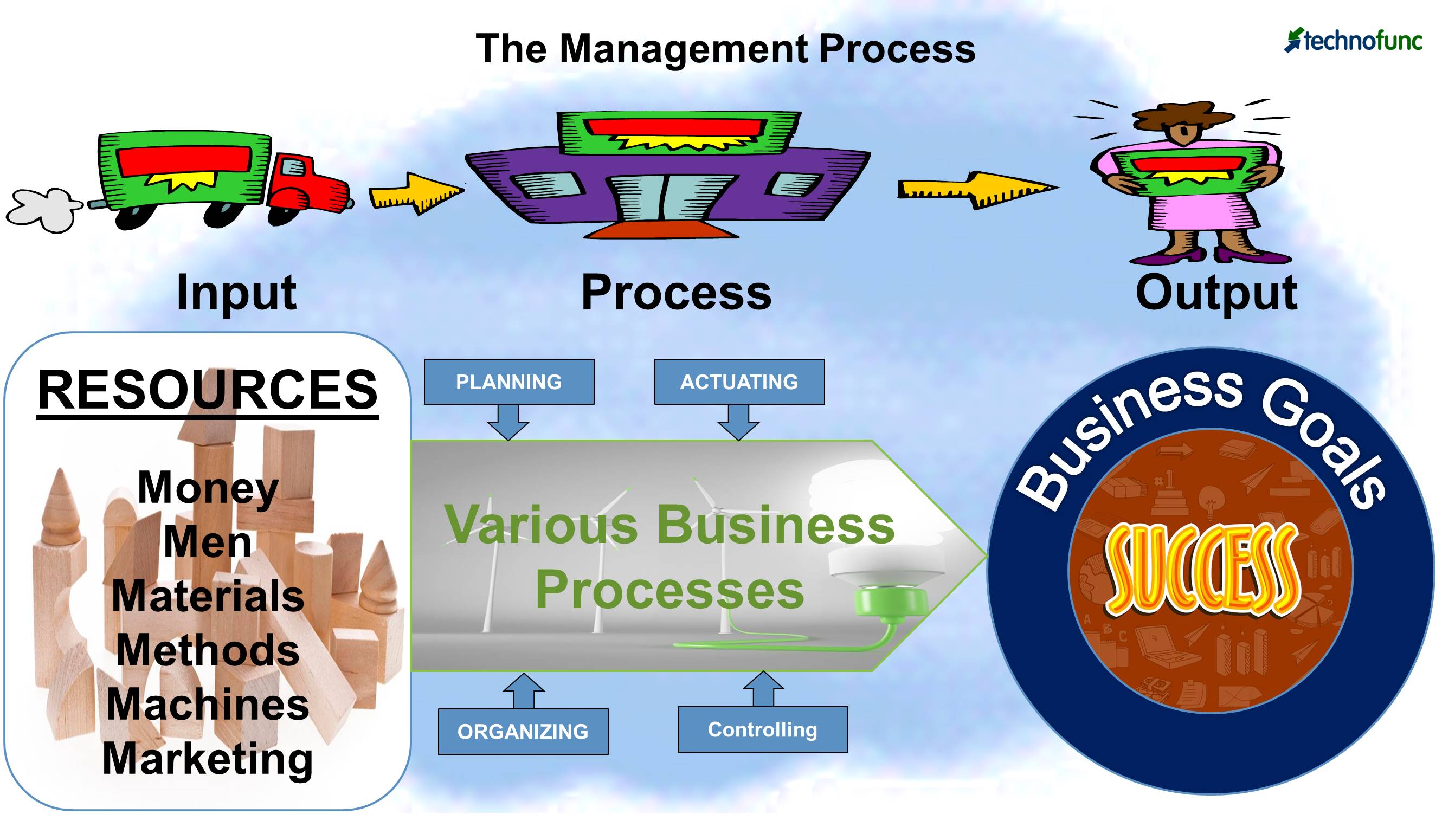- Home
- Business Processes
- Industry Knowledge
- Aerospace Industry
- Automotive Industry
- Banking Domain
- BFSI Industry
- Consumer/ FMCG Industry
- Chemicals Industry
- Engineering & Construction
- Energy Industry
- Education Domain
- Finance Domain
- Hospitality Domain
- Healthcare Industry
- Insurance Domain
- Retail Industry
- Travel and Tourism Domain
- Telecom Industry
- Leadership Skills
- eLearning
- Home
- Leadership
- Leadership Styles
- Concept of Management
Concept of Management
The concept of management refers to the process of planning, organizing, staffing, directing, coordinating, and controlling to achieve organizational goals. It is the management of human, physical, financial, and other valuable resources of the organization in an effective and efficient manner to achieve business objectives.
Different people have conceived and defined management in different ways. But, the essence of management lies in determining worthwhile goals and then carefully selecting and utilizing resources through efficient and effective planning, organizing, actuating, and controlling to achieve those goals.
Who is a Manager?
You are a manager. What does this mean? The word derives from the ancient French word for handling horses and a later one for handling the affairs of the kitchen. Cynics might replace horses with donkey, but all would see the analogy of keeping an organization alive through the activities of the kitchen. Probably the one that is most simple, popular, and often quoted by many in general is "getting things done through other people."
Let us now look at different definitions that highlight important aspects of management.
- Management is a distinct process consisting of activities of planning, organizing, actuating and controlling, performed to determine and to accomplish stated objectives with the use of human beings and other resources (Martin, 1977).
- Good management is merely the exercise of common sense and the Golden Rule (Daniel, 1976)
- The six M’s (money, men, materials, methods, machines, and marketing) of management or the basic resources, as they are often called, are subjected to the fundamental functions of management - planning, organizing, actuating, and controlling -to achieve stated objectives.
- Management is an art struggling to become a science.
- Management science is a body of systematized knowledge accumulated and accepted with reference to the understanding of general truths concerning management.
- The art of management is a personal creative power plus skill in performance. The contemplation of problems, events, and possibilities develops personal creative power, while experience, observation, and study of results contribute to skilled performance. It other words, management art involves envisioning an orderly whole from chaotic parts, communicating the vision, and achieving the goal. It is the "art of arts" because it organizes and uses human talent (Boehringer, 1975)

From these definitions, we can infer that the principles and the techniques of management are not only applicable to the business world but they can be equally applied universally. They also find application in social, religious, charitable, and non-profit organizational contexts.
Essentially we can conclude that management is the integration of human and other resources in a manner that leads to effective utilization and harmonization of the individual efforts with organizational goals.
Suggested Reading and Resources
Related Links
You May Also Like
-
Quantitative Theory of Management
The quantitative management approach is given by the mathematical school that recommends the use of computers and mathematical techniques to solve complex management issues and assist in the managerial decision-making process. Managers observe historical quantitative relationships and use quantitative techniques such as statistics, information models, and computer simulations to improve their decision making.
-
Maslow's hierarchy of needs is a motivational theory that explains that people are motivated by five basic categories of human needs. These needs are physiological, safety, love and belonging, esteem, and self-actualization. There is a little scientific basis for this concept of a hierarchy of needs.
-
Leadership has been defined in different ways by different sets of scholars. In very simple terms leadership can be defined as the skill of a person to influence an individual or a group for achievement of a goal in a given situation. One can use different dimensions and perspectives to define leadership. Through the evolution of leadership thought, leadership has been defined in various ways discussed here.
-
Behavioral Approach to Management
The behavioral management theory had a profound influence on management by focusing on understanding the human dimensions of work. It is also called human relations movement as behavioral theorists focused on managing productivity by understanding factors of worker motivation like their needs and expectations, personality, attitudes, values, group behavior, conflict, and group dynamics. It advocated the use of psychological techniques to motivate employees.
-
Productivity is defined not in terms of the number of goods produced, but in terms of value-added per employee. Customers don’t really buy goods and services but in fact, they buy a value - something they value. The future is all about tangible products fulfilling intangible needs. Ideas like this can transform a business and provide them a competitive advantage to thrive in the future.
-
In today's business world, proficiency in management skills is essential for career growth and success. Managerial skills can be defined as attributes or abilities that are essential for every leader and manager to succeed and fulfill specific tasks expected from them by the organization.
-
There are four characteristics of leadership that help us to understand the character of leadership as a concept. 1. Leadership is a process, 2. Leadership involves influence, 3. Leadership always occurs in a group context and 4. Leadership involves goal attainment. These are the four components that make up the character of the 'leadership' term and help us to define the leadership concept. All of these components of leadership have common characteristics.
-
Modern Approaches to Management
The modern approaches to management look at organizational management in the current context. They take a holistic approach and look at organizations as a collection of interrelated parts influenced by both internal dynamics and also the larger external environment. These modern management theories have played a significant role in the evolution of management studies.
-
Certain generally accepted truths or principles of communication are important to consider when communicating with others. These principles hold true for all people in every culture. By understanding these principles, you will experience greater communication effectiveness. An effective communication system is one that achieved its objectives. Communication is effective where there are no barriers to communication.
-
Team Foundation in Forming Stage
This is the first stage of team development. This is the stage when the foundation of the team is laid. During the Forming stage, team members have a high dependence on their leader for guidance. Learn the practical strategies you can use during this stage to help your team develop into a highly effective performing team.
Explore Our Free Training Articles or
Sign Up to Start With Our eLearning Courses

About Us
Learning
© 2023 TechnoFunc, All Rights Reserved










